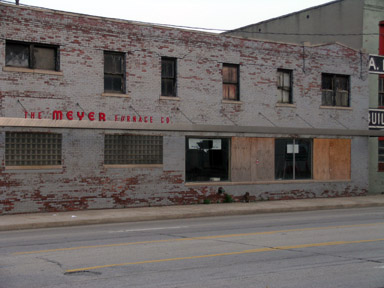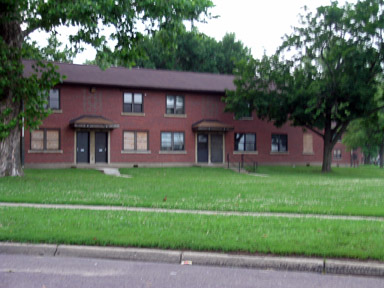Remember when the City of Peoria tried shaming slumlords by putting a sign in front of their rundown properties with the name and number of the owner? Maybe the city should put one of those signs in front of these properties:


Know who owns these properties? The top one is the old Meyer building in the Warehouse District, and it’s owned by the illustrious District 150, which is terribly concerned about losing tax revenue from the Warehouse TIF. Of course, their neglected property isn’t contributing to lower property values down there, right? Margaret Hanley, who owns A. Lucas and Sons right next door, called District 150 out on the condition of their property at a recent council meeting, and rightly so. I wish I could say this was an isolated case, but alas, it isn’t. The district has lots of neglected properties (not to mention their school buildings). They recently demolished one property on Prospect and plan to demolish two more. And they own about 10% of the property in the Warehouse TIF District, which was passed by the council tonight. So put up the sign in front of the Meyer building and others with District 150’s name and number; label it “slumlord.”
The bottom building shows a very small sample of the boarded up windows adorning Harrison Homes, owned by the Peoria Housing Authority. If you’ve ever been by this low-income housing complex, you will notice that just about every building has at least two windows boarded up, often many more. And if you saw the map I posted earlier, you may have noticed that a number of homicides and lots of aggravated discharges of a firearm take place within Harrison Homes. We’re not paying taxes for these people to run a ghetto. They’re supposed to be providing decent transitional housing for people. Allowing their properties to fall into this state of disrepair is egregious. Council members Gary Sandberg and Barbara Van Auken called PHA out on the state of their properties at tonight’s council meeting, and rightly so. Put up the sign in front of Harrison Homes with the PHA’s name and number; label it “slumlord.”
It’s time for these public bodies to step up to the plate and take responsibility for their role in lowering property values and providing havens for crime. If they don’t, then the city should go after them just like they would any other slumlord. If these public bodies moan and complain, the city can explain that they’re just cracking down on crime and trying to raise property values, for the betterment of all Peorians.

To be fair, I believe PHA has little choice but to board up the windows of unoccupied units where the windows are continually being broken out. Blame the tenants and their visitors, not the PHA.
Gee, I wonder if Code Enforcement has issued tickets?
Vonster, “to be fair,” any other property owner would be fined out the wazoo for keeping their property in such a state of disrepair. Why should public housing have a different standard?
The fuzziness of your Harrison Homes photo tells me you didn’t stop and get out of the car. Don’t blame you, really.
CJ: Do you know if any of the Dist. #150 schools have been cited for safety violations (i.e. fire alarm systems in poor condition, improper storage of chemicals/hazardous materials, tornado readiness, asbestos, etc.) and if so, has the district completed the appropriate repairs/maintenance to cure the violations?
If we to fine them, wouldn’t that be fining ourselves? Doesn’t our tax dollars pay for the places? They pay fines and then less gets done. Maybe instead of fines, we should be holding the people in charge responsible. Be prepared for the “no money in the budget” routine and answer it, “Why not, is it not your job to budget?” How about they clean up their act or we start replacing the people in charge and work our way down.
Okay so the windows keep getting broken. Wouldn’t it make more sense to put in plexiglas unbreakable windows in the first place? Now those are expensive, but you would only buy them once and not have to replace or board up broken windows repeatedly.
Keith,
both need to be done. If tenants keep breaking items or if their guests keep breaking items, then common sense says get rid of the tenants. It is the landlord’s job to screen the tenants, hold them accountable for damages and get rid of them if they are nuisance. That is just running a good business. What happens is that the bad landlords (which is really a small percentage, it just FEELS like the majority at times when we’re frustrated), anyway, they will either 1. not make the repairs until made to. 2. not bothering to screen the tenants. 3. don’t get rid of nuisance tenants as they are getting the money (section 8 or drug money) anyway. 4. don’t make sure that it is the same people and same amount of people living in the house as per the lease agreement. 5. don’t educate the tenant on the expections of living in the property (eg: mow the grass, pick up litter, don’t have loud parties, etc.) This is a business not a hobby. Some of them simply drop whomever can pay and look the other way.
I have a house down the street, there are a good 20 people living in it at any given time. There have been 6 arrests from people staying there, 5 were from drugs. How many times does a landlord need to see the address of a house they own in the paper under the police and courts section before they start to wonder. They have had three sets of bad tenants, each getting worse and worse and make a ton of money on Section 8. So they don’t care. Evictions only happen when a. they don’t pay the rent or b. they have done so much damage that when the neighbors demand a rental inspection they have to fork out a lot of money to make the repairs.
This is a “group of investors” with a name that has “religious” connotations. What crock that is on top of it. They are the poster landlords for the need for intense reforms that are specifically directed at landlords that run a bad business. A system could be designed that would essitially not effect the good landlords and give the “shape up or ship out” orders to the bad ones.
If you look up the Section 8 code for housing there are restrictions on how many people can reside in a specific house or apartment and the condition that it must be kept in by the landlord. Unfortunately many of those receiving these payments are not keeping up their end of the rules and the tenants certainly are not. We need more inspectors and tougher rules to cut back on the breaking of these rules and making neighborhoods were there is Section 8 housing more neighborhood friendly. Again its just a case of enforcing the rules on both sides of the fence.
For the record, there are landlords enrolled in Section 8 who do a fine job. Only the neighbors don’t know about them because the tenents don’t act like sterotypical Section 8 tenants and the properties are kept up.